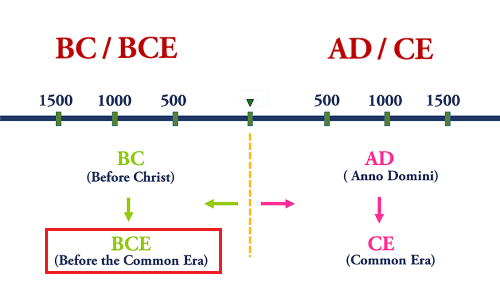What is the full form of BCEBCE: Before Common EraBCE stands for Before Common Era. It is used the same way as the traditional abbreviation BC (Before Christ) and also has the same meaning "previous to year 1 CE (Common Era). BCE is a recent term that is used in place of BC, e.g., 200 BC, and 200 BCE has the same meaning.  BCE is the number of days or before the year in which Jesus is believed to have been born. The Gregorian calendar is used as the reference point for dates throughout the world. Despite having its roots in the Western Christian tradition, its use has since extended globally and is now independent of language, culture, and religion. The Gregorian calendar, as most people are aware, is based on the purported birth date of Jesus Christ. Years after this event count up and are preceded by either AD or CE, while years before it counts down and is preceded by either BC or BCE. The Latin phrase AD (anno Domini), which means "in the year of the Lord," has a secular equivalent in CE (Common Era). Manuscripts from as early as 1708 have been found to contain the BCE/CE format, indicating that this system has been in use for a number of centuries. For more than a century, Jewish intellectuals have frequently used BCE/CE. During the first half of the twenty-first century, there has been a noticeable rise in the general acceptance of BCE/CE in research and academia. Today, most countries and educational institutes have officially replaced the traditional abbreviations AD/BC with CE/BCE. For example, Wales and England introduced the CE/BCE system into their official school curriculum in 2002. Australia followed it in 2011. Also, in the United States, most of the history tests and textbooks use CE/BCE. A year written without letters (CE or BCE) is considered a Common Era, starting from year 1. CE or BCE should be used if there are chances of misunderstanding, e.g., in texts where years both before and after year 1 are mentioned. For example, the ancient city was founded around 200-300 BCE but was destroyed in 80 CE due to volcanic eruptions, floods, and earthquakes. There was only one issue with this date scheme: nobody knew exactly when Jesus of Nazareth was born. Dionysius did not know the date of Jesus' birth, and neither does his system claim to be able to do so. In order to develop a Christian calendar that would be acceptable to both the western and eastern churches of the time and harmonise the celebration of Easter, he appears to have relied on scripture and historical knowledge from the time to arrive at his estimates. Other abbreviations of BCE
Next TopicFull Forms List |